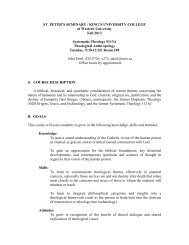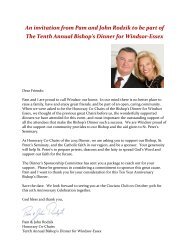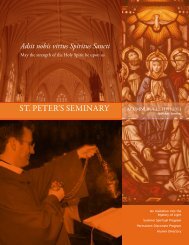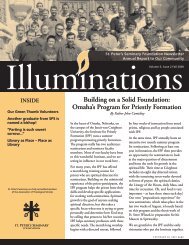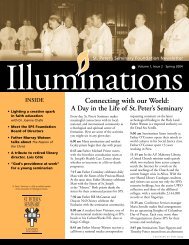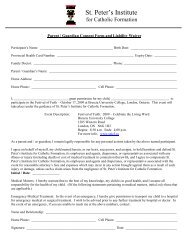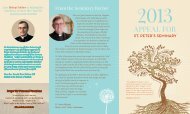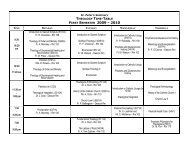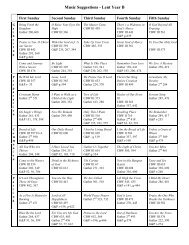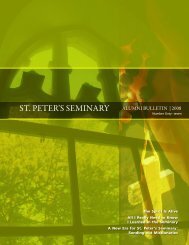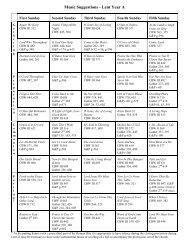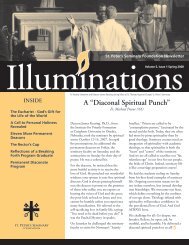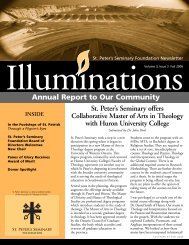Michael R. Prieur Seminary Archives St. Peter's Seminary
Michael R. Prieur Seminary Archives St. Peter's Seminary
Michael R. Prieur Seminary Archives St. Peter's Seminary
You also want an ePaper? Increase the reach of your titles
YUMPU automatically turns print PDFs into web optimized ePapers that Google loves.
<strong>Michael</strong> R. <strong>Prieur</strong> <strong>Seminary</strong> <strong>Archives</strong><br />
<strong>St</strong>. Peter’s <strong>Seminary</strong><br />
General Information, Policies & Procedures<br />
Third Edition<br />
March 2012<br />
Published by: <strong>Michael</strong> R. <strong>Prieur</strong> <strong>Seminary</strong> <strong>Archives</strong>,<br />
<strong>St</strong>. Peter’s <strong>Seminary</strong><br />
1040 Waterloo <strong>St</strong>reet North<br />
London, Ontario, Canada N6A 3Y1<br />
Copyright©2012 by <strong>Michael</strong> R. <strong>Prieur</strong> <strong>Seminary</strong> <strong>Archives</strong><br />
First Edition: February 2010<br />
Second Edition: September 2010
<strong>Michael</strong> R. <strong>Prieur</strong> <strong>Seminary</strong> <strong>Archives</strong><br />
<strong>St</strong>. Peter’s <strong>Seminary</strong><br />
General Information,Policies & Procedures<br />
Third Edition<br />
March 2012<br />
“A service rendered to the Truth"
Table of Contents<br />
Introduction………………………..………………….……… 1<br />
Mission & Mandate…………………..……………….……… 2<br />
Organizational <strong>St</strong>ructure…………..………………….………. 2<br />
History of the <strong>Archives</strong>………..……………………….……... 3<br />
Collection………………………..…………………….……… 4<br />
Policies…………………………..…………………….……… 8<br />
Accessioning & Deaccessioning of Records….……… 8<br />
Conservation & Preservation………….……………. .10<br />
Access & Privacy………………….………………… 10<br />
Use of the <strong>Archives</strong>…………….……………………. 11<br />
Loans & Returns………………………….………….. 11<br />
Reproduction Services…………………….…………. 13<br />
Policy Review…………………………….………….. 13<br />
Appendices……………………………………….….………. 13<br />
Sources Consulted……………………………….….……….. 17<br />
Contact Us…………………………………….….………….. 18
Introduction<br />
<strong>Archives</strong> form the collective memory of a people, nation or institution. <strong>Archives</strong> assist these groups in not only<br />
remembering and understanding their origins and histories, but also give form to their identities, how they have<br />
transformed over time and the possibilities that exist for the future.<br />
For this reason, the work of archives is especially important to the Church. As a faith community, we have the<br />
responsibility of preserving and maintaining those records which testify to the history of the Church, its institutions<br />
and of its faithful who have sowed the seed of God’s Word in the hearts of men and women. If this does not occur,<br />
and records are damaged or misplaced, the evidence of the faith of previous generations is lost forever.<br />
The importance of ecclesiastical archives is closely linked with the Church’s mission to evangelize every nation.<br />
With the aid of literature, the arts, music and architecture, the Church has proclaimed the Gospel to the world.<br />
However, only by the preservation of these historic records has the Church been able to continue this same work of<br />
communicating the message of hope and salvation to countless numbers of people to this very day.<br />
In the archived history of the Church is found the story of our Lord Jesus Christ alive and at work through the<br />
service of God’s people: a story of the expansion, ingenuity and vitality of the faith. It is at this “school of history”<br />
where Catholic communities can rediscover once again the whisperings of the Spirit, who constantly calls us forth to<br />
renew the face of the earth in the great work of evangelization which commenced at Pentecost. “Thus,” says Pope<br />
Paul VI, “having veneration for these papers, documents and archives, means having veneration for Christ, having a<br />
sense of the Church; it means giving to ourselves and those who will come after us the history of the passage of this<br />
phase of transitus Domini in the world”. ¹<br />
The preservation of historic records is the responsibility of the clergy and the heads of Catholic institutions in<br />
fulfilling their mission of evangelization. The Pontifical Commission for the Cultural Patrimony of the Church<br />
strongly suggests that seminarians be made adequately aware, during their formation, of the importance and<br />
necessity of the cultural heritage of the Church as part of the evangelization and pastoral care of the faithful.2<br />
Future clergy are to be provided with the necessary training to distinguish records of historical value and to provide<br />
for their appropriate care and preservation as a witness to future generations.<br />
The establishment, maintenance and support for ecclesiastical archives is a necessary component for evangelization,<br />
the renewal of the faith and of our rich spiritual heritage which has been gifted to us by the sacrifice and witness of<br />
those who have gone before us. On the occasion of the centennial of the Vatican Secret <strong>Archives</strong>, Pope John Paul II<br />
stated: “The documents of the Church bear witness to the spread of the Kingdom of Christ in the world… The<br />
worthy and adequate preservation of these documents from the most humble to the most precious becomes a service<br />
rendered to the Truth.” 3<br />
In this same spirit, the following will serve as the guiding principles and policies of the <strong>Archives</strong> in its mission to<br />
record and preserve the work of the Lord at <strong>St</strong>. Peter’s <strong>Seminary</strong>.<br />
1. Pope Paul VI, Address. To the Ecclesiastical Archivists, 26 September 1963, n. 4 (See Sources Consulted.)<br />
2. Pontifical Commission for the Conservation of the Artistic and Historical Patrimony of the Church. Circular<br />
Letter. On the cultural and pastoral training of future priests in their upcoming responsibilities concerning the<br />
artistic and historic heritage of the Church. 15 October 1992.<br />
3. Pope John Paul II. Address. At the Inauguration of the exhibit on the occasion of the first centenary of the<br />
opening of the Vatican Secret <strong>Archives</strong>. 4 April 1981, n. 6<br />
1
Mission & Mandate<br />
Mission<br />
The <strong>Michael</strong> R. <strong>Prieur</strong> <strong>Seminary</strong> <strong>Archives</strong> is dedicated to acquiring, preserving and making available the<br />
material heritage of the <strong>Seminary</strong> as a permanent resource in support of the administrative, educational and<br />
research needs of the <strong>Seminary</strong> community.<br />
Mandate<br />
The <strong>Michael</strong> R. <strong>Prieur</strong> <strong>Seminary</strong> <strong>Archives</strong> is responsible for the appraisal, acquisition, preservation and use<br />
of <strong>Seminary</strong> records and artifacts of enduring value which pertain to the origin, history, growth and spirit of<br />
the <strong>Seminary</strong>, as well as the records of the individuals and organizations associated with the <strong>Seminary</strong>.<br />
In fulfilling its mandate, the <strong>Archives</strong> will serve as the collective memory of the <strong>Seminary</strong>, linking together<br />
our past, present and future. As “a service rendered to the Truth”, the <strong>Archives</strong> will seek to assist the<br />
<strong>Seminary</strong> in the fulfillment of its mission:<br />
Organizational <strong>St</strong>ructure<br />
“Inspired by the love of God, <strong>St</strong>. Peter’s <strong>Seminary</strong> serves the Church in Canada and beyond as the<br />
Roman Catholic <strong>Seminary</strong> of the Diocese of London, providing an integrated program of spiritual,<br />
human, intellectual and pastoral formation and discernment for those preparing for priestly<br />
ministry according to the heart of Christ.<br />
The <strong>Seminary</strong> also provides an integrated program for those preparing for the permanent diaconate<br />
and lay ministry, and for those seeking to enrich their faith education.”<br />
<strong>Seminary</strong> Archivist<br />
The Rector will appoint the <strong>Seminary</strong> Archivist who is responsible for the overall supervision and<br />
management of the <strong>Archives</strong>.<br />
<strong>Archives</strong> Appointee<br />
The Rector will also appoint a seminarian, with the consultation of the <strong>Archives</strong> Committee, to assist the<br />
Archivist in his work.<br />
The <strong>Archives</strong> Appointee is accountable to the <strong>Archives</strong> Committee.<br />
The responsibilities of the <strong>Archives</strong> Appointee, in addition to the position description contained in<br />
Appendix 1, are to:<br />
1. Accession, catalogue and file records according to the procedures set out in this manual.<br />
2. Maintain and update spreadsheets, finding aids and other documentation (see Appendices for<br />
samples).<br />
3. Adhere to the policies and procedures as established by the <strong>Archives</strong> Committee as contained in<br />
this General Information, Policies & Procedures manual.<br />
4. Maintain a list of required archival supplies and contact library staff when supplies are needed.<br />
(Library budgets money for archival supplies).<br />
2
5. Complete an annual report which will be submitted to the <strong>Archives</strong> Committee at the end of each<br />
academic year. This report will review the activities of the <strong>Archives</strong> in the past year, including<br />
statistics on the use of the <strong>Archives</strong>, projects carried out, accessions, the number of visitors and<br />
researchers, funds earned, etc.<br />
6. Respond to requests for information from the <strong>Archives</strong>.<br />
7. Provide tours of the <strong>Archives</strong>.<br />
In the performance of his duties, the <strong>Archives</strong> Appointee will come into contact with confidential<br />
information. Prior to the commencement of his duties, he will sign the Oath of Confidentiality and a<br />
copy will be kept on file in the <strong>Archives</strong>.<br />
<strong>Archives</strong> Committee<br />
History of the <strong>Archives</strong><br />
The Archivist will be assisted by a committee comprised of:<br />
1. Chief Librarian,<br />
2. <strong>Archives</strong> Appointee(s),<br />
3. <strong>St</strong>aff member of the A.P. Mahoney Library,<br />
4. Archivist for the Diocese of London.<br />
The <strong>Archives</strong> Committee is directly responsible to the Rector. The purpose and objectives of the<br />
<strong>Archives</strong> Committee are to:<br />
1. Make recommendations for the management and development of archival activities<br />
within the <strong>Seminary</strong> in order to ensure the retention of records of enduring value.<br />
2. Recommend policies and procedures for a continuing program of records management.<br />
3. Oversee the archival needs, both physical and operational, of the <strong>Seminary</strong> in order to<br />
advance the preservation of the collection.<br />
4. Provide management and accountability of the <strong>Archives</strong>’ budget.<br />
The <strong>Archives</strong> of <strong>St</strong>. Peter’s was established in 1926 with the opening of the current location of the<br />
<strong>Seminary</strong>. Msgr. F.J. Laverty and Fr. A.J. Durand were instrumental in the development and growth of the<br />
<strong>Archives</strong> from approximately 1930-1969.<br />
The <strong>Archives</strong> has a strong connection to the Alumni Association, which generally has been responsible for<br />
the maintenance of the <strong>Archives</strong>. The Secretary-Treasurer of the Alumni Association usually serves as the<br />
<strong>Seminary</strong> Archivist. With his appointment as Secretary-Treasurer in 1969 by then Rector, Fr. J.J. Carrigan,<br />
Fr. <strong>Michael</strong> <strong>Prieur</strong> took over the position as <strong>Seminary</strong> Archivist. It is a role that he continues to hold today<br />
under the appointment of the last six rectors.<br />
In 1999, under the guidance of then Rector, Fr. William McGrattan, the materials were transferred from the<br />
vault to two designated rooms on the lower level of the <strong>Seminary</strong>. From 1999-2003, Fr. Charles McManus<br />
assisted in the <strong>Archives</strong> by cataloguing and organizing many of the files.<br />
3
Collection<br />
From 2004-2005 and again from 2007-2010, Fr. <strong>Prieur</strong> was assisted in the <strong>Archives</strong> by Fr. Victor De<br />
Gagne, who continued the work of cataloguing files and also oversaw the process of relocating the<br />
<strong>Archives</strong> to the A.P. Mahoney Library.<br />
In October 2008, <strong>St</strong>. Peter’s <strong>Seminary</strong> initiated a process of transferring the <strong>Archives</strong> to a more suitable<br />
location which would be more conducive to the preservation of our holdings. In late November of the same<br />
year, the <strong>Archives</strong> was relocated to the lower level of the A.P. Mahoney Library in order to benefit from<br />
the environmental controls and security of the Library. The <strong>Archives</strong> is grateful for the guidance and<br />
expertise provided by Debra Majer, the Archivist for the Diocese of London.<br />
In honor of forty-two years of dedicated service to the meticulous organization of the <strong>Seminary</strong> <strong>Archives</strong><br />
and Fr. <strong>Prieur</strong>’s dedication to the <strong>Seminary</strong> Alumni Association, the <strong>Seminary</strong> <strong>Archives</strong> Collection was<br />
officially named the <strong>Michael</strong> R. <strong>Prieur</strong> <strong>Seminary</strong> <strong>Archives</strong> and dedicated on October 12, 2011.<br />
Currently, the <strong>Archives</strong> Appointees are Mr. David Johnston (2010- ) and Mr. Tim Theriault (2012- ).<br />
Those records of enduring value that document the collective memory of the <strong>Seminary</strong> are acquired,<br />
preserved and made available in the <strong>Michael</strong> R. <strong>Prieur</strong> <strong>Seminary</strong> <strong>Archives</strong>. Such records are transferred<br />
from the administration and faculty of the <strong>Seminary</strong>, while others are donated from a variety of sources,<br />
including students, alumni and other interested persons and groups.<br />
Principle Kinds of Records<br />
Administrative Records<br />
Administrative records will compose an individual series. Documents will be filed in chronological order<br />
within a particular subject heading within the series. A finding aid for the series will be prepared. Some<br />
records are restricted.<br />
A.P. Mahoney Library<br />
These records will compose an individual series. Documents will be filled in chronological order and a<br />
finding aid will be prepared.<br />
Alumni Association<br />
Records of the Alumni Association will compose an individual series. Records are divided into “Alumni<br />
Association”, “<strong>St</strong>ranton Alumni Chapter”, “Alumni Reunions”, and “Alumni Bulletins” each in their own<br />
boxes. Documents are filed in chronological order and separate finding aids will be prepared.<br />
Building & Grounds<br />
These records will compose an individual series. Records are divided into sub-series which are filed<br />
alphabetically. Records within each sub-series are filed in chronological order. A finding aid for the series<br />
will be prepared.<br />
4
Classes & Groups<br />
These records will compose an individual series. Records for classes are divided into a sub-series which<br />
are filed in chronological order. Records for groups are divided into a sub-series which are filed in<br />
alphabetical order. A finding aid will be prepared.<br />
Committees<br />
Records of committees will compose an individual series. Records are divided according to the title of the<br />
committee and are filed in alphabetical order. Within each sub-series, the records are filed in chronological<br />
order. A finding aid for the series will be prepared.<br />
Diocese of London<br />
Records pertaining to the Diocese of London will compose an individual series. Documents will be filed in<br />
chronological order and a finding aid will be prepared.<br />
Diocesan Bishops<br />
The records of each Diocesan and Auxiliary Bishop will be an individual series. Each series will be<br />
arranged alphabetically by surname. Records within the series will be filed in chronological order and a<br />
finding aid for the series will be prepared.<br />
Faculty Members<br />
The records of each faculty member will compose an individual series. Each series will be arranged<br />
alphabetically by surname. Records within the series will be filed in chronological order and a finding aid<br />
for the series will be prepared.<br />
Financial Records<br />
These records will compose an individual series. Documents will be filed in chronological order and a<br />
finding aid will be prepared.<br />
Graduates<br />
Records of graduates will compose an individual series. Documents are filed alphabetically according to<br />
surname. A finding aid will be prepared. Graduates who later become faculty members or rectors will<br />
have their file transferred to the appropriate series and the finding aids will be updated.<br />
Permanent Diaconate Program<br />
These records will compose an individual series. Documents will be filed in chronological order and a<br />
finding aid will be prepared.<br />
Rectors<br />
The records of each rector will compose an individual series. Each series will be arranged alphabetically<br />
by surname. Records within the series will be filed in chronological order and a finding aid for the series<br />
will be prepared.<br />
<strong>St</strong>. Thomas Aquinas Chapel<br />
These records will compose an individual series. Documents will be filed in chronological order and a<br />
finding aid will be prepared.<br />
<strong>St</strong>. Peter’s <strong>Seminary</strong> Foundation<br />
These records will compose an individual series. Documents will be filed in chronological order and a<br />
finding aid will be prepared.<br />
5
Save A Family Plan<br />
These records will compose an individual series. Documents will be filed in chronological order and a<br />
finding aid will be prepared.<br />
<strong>Seminary</strong> History<br />
These records will compose an individual series. Documents will be filed in chronological order and a<br />
finding aid will be prepared.<br />
Sisters of the Precious Blood, London<br />
These records will compose an individual series. Documents will be filed in chronological order and a<br />
finding aid will be prepared.<br />
Sisters of <strong>St</strong>. Joseph, London<br />
These records will compose an individual series. Documents will be filed in chronological order and a<br />
finding aid will be prepared.<br />
Other Textual Holdings<br />
As necessity requires, other series will be formed, arranged in a logical order, and a finding aid prepared;<br />
i.e. Cartier-Macdonald Scholarship in Canadian History.<br />
Finding Aids for Textual Records<br />
Textual records will be recorded in a finding aid (see Appendix 11). The fields are as follows:<br />
1. File #: list the number found in the upper right corner of the file folder;<br />
2. File Title: list the title of the file as found on the file folder;<br />
3. Date (to): list the date of the materials; or the file contains a series of textual records, list the date<br />
of the earliest entry;<br />
4. Date: if the file contains a series of textual records, list the date of the final entry;<br />
5. Notes: any additional information which does not fit into the above fields.<br />
Other Holdings<br />
The collection consists of items in various mediums beyond textual records including art, artifacts, books,<br />
liturgical items, media (audio, video, slides and digital), photographs and relics.<br />
Art, Artifacts, Books & Liturgical Items<br />
Each of these groupings will be catalogued and each item in the group will be given a number prefixed by<br />
the group’s alphabetical code, i.e., ART- art, AF – artifacts, BK- Books, LIT – liturgical items. Box<br />
numbers will be assigned to the containers in each category, prefixed by the group’s alphabetical code.<br />
Each grouping will be recorded in an artifacts inventory spreadsheet (see Appendix 2). The fields are as<br />
follows:<br />
1. Inventory Number: assign a number to the item based on the group’s alphabetical code, i.e. AF-<br />
001, LIT-054, etc.;<br />
2. Title: list the title or name of the item;<br />
3. Creator: list the name of the creator or author;<br />
4. Description of Material: a detailed description of the item. i.e. material type, size, quantity, etc.;<br />
5. Date: list the date the item was created or published;<br />
6. Donor(s): the name(s) of the donor(s) and other necessary information;<br />
7. Notes: any additional information which does not fit into the above fields.<br />
6
Media Collection<br />
The <strong>Archives</strong> is committed to the preservation of our media collection. To this end, the <strong>Archives</strong><br />
Committee will institute a digitization program to transfer its audio and video cassettes and film to digital<br />
format.<br />
The digitization program will consist of the following working principles:<br />
1. Each cassette and/or film to be digitized will have two (2) digital copies made and both will be<br />
stored in the <strong>Archives</strong>. One (1) copy will be labeled as a “loan copy” and the other will be kept as<br />
a backup copy. The backup copy is never to be loaned from the <strong>Archives</strong>.<br />
2. Once audio and video cassettes and films have been digitized, the originals will be deaccessioned<br />
and destroyed by a suitable means.<br />
3. All media will be stored in proper archival containers and will be kept separate from the textual<br />
records and artifacts in the collection.<br />
The media collection will be recorded in a media inventory spreadsheet (See Appendix 3). The fields are<br />
as follows:<br />
1. Inventory Number: assign a number to the item and ensure that the number is listed on the case;<br />
2. Title: list the title as it appears on the item;<br />
3. Contents: give a brief synopsis of the contents, i.e. ordination to the priesthood in 1977, etc.;<br />
4. Date of Production;<br />
5. Format: list the format of the medium, i.e., DVD, audio cassette, etc.;<br />
6. Location of Master Copy: list the location of the master copy and the contact information of the<br />
person and/or company if applicable;<br />
7. Notes: any additional information which does not fit into the above fields.<br />
Photographs<br />
Photographs are filed in the appropriate series according to its content, i.e., <strong>Seminary</strong> History, Graduates,<br />
etc. Photographs of a miscellaneous nature are filed in boxes according to decade. As photographs are<br />
accessioned, the name(s) of the person(s) depicted, event, date, etc., are to be written on the back of the<br />
photograph.<br />
The <strong>Archives</strong> will not retain every photograph that comes into its possession. As a general rule, ten (10)<br />
percent of photographs of a specific event will be accessioned and catalogued in the collection.<br />
Photographs that are duplicates, blurry, over or under exposed, or contain inappropriate gestures, etc. will<br />
not be kept in the collection and will be destroyed by shredding. The deaccession and destruction of such<br />
photographs will be recorded in the deaccession spreadsheet.<br />
Relics<br />
Relics will be stored in an archival artifacts box. Supporting documentation will be stored separately from<br />
the relics in archival file folders with a completed separate sheet attached.<br />
Relics are recorded in a relics inventory spreadsheet (see Appendix 4). The fields are as follows:<br />
1. Inventory Number: assign a number to the relic and ensure that the number is listed on the<br />
container it is housed in and the authenticating documents;<br />
2. Name of Saint(s): include the name of the saint(s) or blessed(s) as they appear on the<br />
documentation or on the reliquary;<br />
3. Class: first, second or third class (add additional details, i.e., bone fragment, clothing, etc.);<br />
7
Policies<br />
4. Container: theca, paper, altar stone, etc.;<br />
5. Description of Container: refers to the physical description of the container housing the relic, i.e.,<br />
round, metal, wood, etc.;<br />
6. Supporting Documentation: does the relic have supporting documentation, the nature of the<br />
document, the issuing body, date, location of documentations, etc.;<br />
7. Notes: any additional information which does not fit into the above fields, i.e., name of donor,<br />
where the relic was originally housed, etc.<br />
Inventory of the Collection<br />
The <strong>Archives</strong> Appointee is to keep an inventory of the archival collection. This inventory is to include the<br />
particular details of all holdings, whether catalogued, in the process of being catalogued or unprocessed.<br />
The inventory is recorded on a spreadsheet according to the series title (see Appendix 5). Under each series<br />
title, the fields are as follows:<br />
1. Record Title: list the nature of the records, i.e., William T. McGrattan, Extravaganza, etc.;<br />
2. Date Range; earliest to latest dates;<br />
3. Number of Boxes;<br />
4. Location: the physical location of the boxes within the <strong>Archives</strong>, i.e., shelf number;<br />
5. Notes: any additional information which does not fit into the above fields.<br />
Accessioning & Deaccessioning of Records<br />
Accessioning of Records<br />
The <strong>Michael</strong> R. <strong>Prieur</strong> <strong>Seminary</strong> <strong>Archives</strong> acquires records that document the <strong>Seminary</strong>’s history,<br />
organization, structure, programs and functions, according to the following categories:<br />
1. Records of the <strong>Seminary</strong> that are of enduring historical, legal, fiscal and administrative value,<br />
particularly those that denote the functions, policies and decisions of the <strong>Seminary</strong>.<br />
2. Records of <strong>Seminary</strong> organizations, including the records of faculty, student clubs, alumni<br />
association and other groups that document the life of the <strong>Seminary</strong> community.<br />
3. Records of affiliated organizations that document their relationship to the <strong>Seminary</strong>, e.g., <strong>St</strong>.<br />
Peter’s <strong>Seminary</strong> Foundation.<br />
4. <strong>Seminary</strong> publications, newsletters, reports, programs, flyers, calendars, student publications,<br />
Alumni Bulletins, etc.<br />
5. Artifacts relating to the history of the <strong>Seminary</strong>, of individuals connected to the <strong>Seminary</strong>, and<br />
liturgical and religious items.<br />
Materials are primarily acquired through the transfer of records by the <strong>Seminary</strong> administration and<br />
departments. The records of affiliated organizations, the personal papers of individuals and materials from<br />
other sources are accepted in accordance with terms negotiated by the owner and <strong>St</strong>. Peter’s <strong>Seminary</strong><br />
Foundation on behalf of the <strong>Archives</strong> and documented in a formal donation agreement. All donated<br />
materials become the property of the <strong>Archives</strong>. In releasing ownership, copyright is transferred to the<br />
<strong>Michael</strong> R. <strong>Prieur</strong> <strong>Seminary</strong> <strong>Archives</strong>.<br />
8
In special circumstances, the <strong>Archives</strong> may consider acquiring materials that are outside the scope of its<br />
mandate. All such potential acquisitions must be submitted to the Archivist for approval.<br />
The <strong>Archives</strong> reserves the right to decline donations of material which are outside the scope of its mandate.<br />
Normally, religious items of a general nature will not be accepted, unless the material is deemed to be of<br />
historical value.<br />
Accessions are recorded in an accessions spreadsheet (see Appendix 6). The fields are as follows:<br />
1. Date; the date the material was transferred, donated or acquired;<br />
2. Donor(s): the name(s) of the donor(s) and other necessary information;<br />
3. Accession Number: this number is the current year (dash) a three digit number in sequential order<br />
beginning from 001, i.e., 2010-001, 2010-002, etc.;<br />
4. Description of Material: a detailed description of the materials, i.e. material type, size, quantity,<br />
etc.;<br />
5. Date Range: earliest to latest dates;<br />
6. Condition: list the condition of the material and any necessary measures which need to be taken to<br />
ensure the preservation of the material;<br />
7. Notes: any additional information which does not fit into the above fields.<br />
Deaccessioning of Records<br />
The <strong>Archives</strong> reserves the right to permanently remove records that are deemed no longer necessary to be<br />
retained in the collection. The Archivist will be the authority to make this determination, as well as the<br />
method of disposal.<br />
Deaccession may occur for any of the following reasons:<br />
1. The records are outside the scope of the <strong>Archives</strong>’ mandate.<br />
2. The records have deteriorated beyond the possibility of use.<br />
3. The records rightfully belong to another archives or institution. In such instance, the Archivist<br />
will contact the appropriate archives or institution and provide for the transfer of the material.<br />
The disposition of liturgical and religious items, especially relics and altar stones, will be carried out in<br />
accordance with the norms established by the Diocese of London <strong>Archives</strong>.<br />
Deaccessions are recorded in a deaccessions spreadsheet (see Appendix 7). The fields are as follows:<br />
1. Date: the date the material is deaccessioned;<br />
2. Accession Number (if applicable): note, prior to September 2010 accessioned material will not<br />
have this number;<br />
3. Description of Material: a detailed description of the materials, i.e., material type, size, quantity,<br />
etc.;<br />
4. Reason for Deaccession: list the reason for removing the material from the collection as described<br />
in the Deaccession Policy of this manual;<br />
5. Method of Disposal: list the means by which the material will be removed from the collection<br />
according to the following categories: returned to donor, donated to another <strong>Archives</strong>/Institution,<br />
destroyed, or other, as well as provide specific information;<br />
6. Notes: any additional information which does not fit into the above fields.<br />
9
Along with an entry in the deaccession spreadsheet, deaccession will also be recorded along with the date,<br />
in the accessions spreadsheet on the entry line for the same material in the notes field.<br />
Conservation & Preservation<br />
The <strong>Archives</strong> Committee will maintain intellectual and physical control over the collection and will<br />
develop security, storage, handling and preservation procedures to achieve this end, namely:<br />
1. Upon accession, records will be cleaned, using methods appropriate to the medium, in order to<br />
support and protect them during processing, storage and use.<br />
2. Appropriate archival equipment and supplies will be utilized to prevent the deterioration of<br />
records from exposure to environmental factors and over-handling by individuals. Minimally, all<br />
records will be stored in acid-free containers, folders and envelopes.<br />
3. Metal shelving will be used, with the lowest shelf no less than four (4) inches from the floor. The<br />
top of the shelf will not be used for the storage of items.<br />
4. Harsh chemicals and flammable substances will not be stored with the collection.<br />
5. Documentation will be developed and used to record archival activities and practices in order to<br />
preserve and maintain intellectual and physical control. Inventories and finding aids will be<br />
updated at regular intervals.<br />
6. The policies and procedures will be observed at all times. Researchers will be informed of any<br />
pertinent procedures for the use of the <strong>Archives</strong> and the handling of materials.<br />
The <strong>Archives</strong> reserves the right to reproduce materials by any medium for security, preservation or research<br />
purposes.<br />
Access & Privacy<br />
The <strong>Archives</strong> contain various types of records with different restrictions on access, in order to respect the<br />
confidentiality of the personal information contained in the records.<br />
Unless otherwise specified the holdings of the <strong>Seminary</strong> <strong>Archives</strong> are available for research and reference<br />
use by the <strong>Seminary</strong> administration, faculty and other researchers.<br />
The physical security of the <strong>Archives</strong> will be maintained at all times. Access will be limited to the<br />
members of the <strong>Archives</strong> Committee, A.P. Mahoney Library staff, and the Rector. The Archivist will be<br />
notified of any requests for access to the <strong>Archives</strong>.<br />
Restrictions on access are as follows:<br />
1. Confidential Materials: Access is open to authorized <strong>Seminary</strong> personnel only.<br />
2. Donated Materials: Access is subject to any restrictions negotiated with the creator and/or donor of<br />
the material.<br />
3. Fragile, Valuable or Rare Materials: Access to originals may be restricted at the discretion of the<br />
Archivist in order to protect them from damage or loss in which case copies may be substituted for<br />
reference purposes.<br />
4. Unprocessed Materials: Access to any unprocessed material may be restricted at the discretion of<br />
the Archivist, pending a review to ensure that no personal or confidential information is contained<br />
in the documents and to ensure that access is otherwise permitted in accordance with (1) to (3)<br />
above.<br />
10
In all matters regarding personal information and privacy, the <strong>Archives</strong> adheres to the Privacy Policy of <strong>St</strong>.<br />
Peter’s <strong>Seminary</strong>. A copy of this policy can be found at:<br />
http://www.stpeterssseminary.ca/seminary/about/privacy/<br />
Use of the <strong>Archives</strong><br />
The <strong>Archives</strong> seeks to assist researchers. Appointments must be made in advance with the Archivist or his<br />
Appointee to have access to its holdings. The Archivist or his Appointee will retrieve the materials which<br />
can be consulted in the A.P. Mahoney Library reading room.<br />
All records in the <strong>Archives</strong> are not always immediately accessible. Sometimes access restrictions are<br />
placed on materials due to preservation concerns, privacy legislation or donor agreements.<br />
In addition to being original items, archival records are highly fragile and vulnerable to improper handling.<br />
Everyone who handles archival materials shares in the responsibility for their care. Each researcher using<br />
the <strong>Archives</strong> is expected to observe the following practices:<br />
1. Eating and drinking are not permitted.<br />
2. Only pencils can be used for taking notes, as well as laptop computers or cassette recorders. Paper<br />
for note taking is never to be laid on top of archival documents.<br />
3. Documents are filed according to their original order. Care should be taken to maintain this order.<br />
4. The use of gloves may be required to handle some items.<br />
5. Materials are to be handled with care. Place open volumes face down and do not apply pressure to<br />
them in any way. The use of paper flags are required to mark your place in a volume.<br />
Researchers may be requested to submit a copy of the paper, thesis dissertation or publication produced as<br />
a result of the research carried out in the <strong>Archives</strong>.<br />
The <strong>Archives</strong> welcomes visitors. Tours are available by making an appointment in advance with the<br />
Archivist or the <strong>Archives</strong> Appointee.<br />
Researchers and visitors who come to the <strong>Archives</strong> are recorded in a researcher and visitors spreadsheet<br />
(see Appendix 8). The fields are as follows:<br />
Loans & Returns<br />
1. Date of Visit;<br />
2. Name and Institution (if applicable): list the name of the person and the affiliated institution if the<br />
nature of the work is academic or for publication;<br />
3. Purpose of Research and/or Visit: list the nature of the research and/or visit, i.e. tour of the<br />
archives, researching the history of the hockey game against <strong>St</strong>. Augustine’s <strong>Seminary</strong>, etc.; and<br />
4. Time: the amount of time spent researching and/or visiting in the <strong>Archives</strong>.<br />
Materials from the <strong>Archives</strong> may be loaned to other archives or institutions on a case by case basis only<br />
under the following circumstances:<br />
1. The Archivist provides written permission for the loan, including the details of the loan and the<br />
duration.<br />
2. The borrower ensures the adequate care and handling of the material on loan.<br />
11
If the <strong>Archives</strong> determines that the material on loan is not being adequately cared for, the Archivist may<br />
cancel the loan and request the immediate return of the material.<br />
Permanent loans or open-ended returns are not permitted.<br />
Short term loans will only be accepted for reproducing materials for the following reasons:<br />
1. Preparing and mounting a public display.<br />
2. Reference purposes.<br />
3. In those cases that have proven impossible for the <strong>Archives</strong> to negotiate formal donation of<br />
material with the owner.<br />
The original material on loan will not be accessioned and will be returned to the owner as soon as the<br />
reproduction is completed.<br />
The <strong>Archives</strong> reserves the right to provide reproductions of material if it is deemed to be of fragile,<br />
valuable or rare condition.<br />
Material that has been loaned to the <strong>Archives</strong> for copying or display purposes will not be loaned to a third<br />
party without the express permission of the owner.<br />
Loans and returns are recorded by two (2) methods. The first is the completion of a loan agreement. Two<br />
(2) copies of this agreement will be made, one (1) copy will be kept on file in the <strong>Archives</strong> and the other<br />
copy is given to the lender or borrower of the loaned material. Once the material has been returned<br />
according to the conditions of the loan agreement, the lender or the Archivist or his designate will then<br />
complete the bottom portion of the loan agreement.<br />
The second method is recording the loan and return in the loans spreadsheet. Material that is being loaned<br />
to the <strong>Archives</strong> will be recorded in an incoming loans spreadsheet (see Appendix 9). The fields are as<br />
follows:<br />
1. Date of Loan;<br />
2. Name and Institution (if applicable); list the name of the person lending the material and the<br />
affiliated institution, along with contact information;<br />
3. Description of Material: a detailed description of the materials being loaned, i.e. material type,<br />
size, quantity, etc.;<br />
4. Condition: list the condition of the material;<br />
5. Return Date: list the date the loaned material was physically returned to the lender;<br />
6. Notes: any additional information which does not fit into the above fields.<br />
Material that is being loaned out from the <strong>Archives</strong> will be recorded in an outgoing loans spreadsheet (see<br />
Appendix 10). The fields are as follows:<br />
1. Date of Loan;<br />
2. Name and Institution (if applicable): list the name of the person borrowing the material and the<br />
affiliated institution, along with contact information;<br />
3. Description of Material: a detailed description of the materials being loaned, i.e., material type,<br />
size, quantity, etc.;<br />
4. Condition: list the condition of the material;<br />
5. Return Date: list the date the loaned material was physically returned to the <strong>Archives</strong>;<br />
12
6. Notes: any additional information which does not fit into the above fields.<br />
Reproduction Services<br />
Reproductions will be permitted on a case by case basis with the approval of the Archivist for a nominal fee<br />
($0.25 per page) within the limits of the Copyright Act and if the condition of the material warrants<br />
copying. Copies are made by the Archivist or his designate.<br />
Reference to the <strong>Michael</strong> R. <strong>Prieur</strong> <strong>Seminary</strong> <strong>Archives</strong> must always accompany any information which has<br />
been cited, loaned or copied from the <strong>Archives</strong>.<br />
Policy Review<br />
Policies of the <strong>Michael</strong> R. <strong>Prieur</strong> <strong>Seminary</strong> <strong>Archives</strong> will be reviewed on a regular basis or at any time<br />
when the <strong>Archives</strong> Committee deems changes necessary.<br />
Appendix 1<br />
Position Description for the <strong>Archives</strong> Appointee<br />
The <strong>Archives</strong> Appointee is a seminarian appointed by the Rector, on a yearly basis, in consultation with the<br />
<strong>Archives</strong> Committee, to assist the Archivist in his work.<br />
The <strong>Archives</strong> Appointee is accountable to the <strong>Archives</strong> Committee. The <strong>Archives</strong> Appointee is responsible<br />
for:<br />
1. Accessioning, cataloging and filing records in the <strong>Archives</strong>;<br />
2. Keeping documentation (spreadsheets, paperwork, finding aids, etc.) updated;<br />
3. Adhering to the policies and procedures as established by the <strong>Archives</strong> Committee as contained in<br />
the General Information, Policies & Procedures manual;<br />
4. Completing an annual year-end report on the activities of the <strong>Archives</strong>;<br />
5. Maintaining a list of required archival supplies and contacting library staff when supplies are<br />
needed. (Library budgets money for archival supplies);<br />
6. Responding to requests for information; and,<br />
7. Providing tours of the <strong>Archives</strong>.<br />
The <strong>Archives</strong> Appointee is a member of the following committees:<br />
1. The <strong>Archives</strong> Committee; and<br />
2. The 100 th Anniversary <strong>St</strong>eering Committee.<br />
In the performance of his duties, the <strong>Archives</strong> Appointee will come into contact with confidential and<br />
personal information. Prior to the commencement of his duties, he shall sign the Oath of Confidentiality<br />
and a copy shall be kept on file in the <strong>Archives</strong>.<br />
The time commitment averages 2.5 hours per week.<br />
13
Appendix 2<br />
Artifacts Inventory Spreadsheet<br />
Inventory Title Creator Description<br />
Number<br />
Of Material<br />
ART-001 <strong>St</strong>. Therese of Unknown 11x17 oil on<br />
the Little<br />
Flower<br />
canvas<br />
LIT-001 Flower Vases Unknown 2 metal vases<br />
made from<br />
artillery shells<br />
Appendix 3<br />
Media Inventory Spreadsheet<br />
Date Donor(s) Notes<br />
1930 unknown<br />
1917 Unknown WWI<br />
Inventory Title Contents Date of Format Location of<br />
Number<br />
Production<br />
Master Copy<br />
MC-001 Recruits for A day in the Late 1940’s – DVD CIVA<br />
Christ life of a early 1950’s<br />
Communications,<br />
seminarian<br />
London<br />
519-111-0000<br />
MC-OO2 Laymen’s Highlights of 1960 DVD CIVA<br />
Retreats summer<br />
Communications,<br />
retreats<br />
London<br />
519-111-0000<br />
Appendix 4<br />
Relics Inventory Spreadsheet<br />
Inventory Name of Class Container Description of Supporting<br />
Number Saints(s)<br />
Container Documentation<br />
RE-001 Zenon & First Box Wood with No<br />
companions<br />
glass lid and<br />
lock<br />
RE-002 Thomas First Theca Round, silver Yes<br />
Aquinas<br />
Fr. J.J. Carrigan<br />
RE-003 S. Benedict First Box Small lead box Yes<br />
Msgr. A.P.<br />
Mahoney<br />
Notes<br />
No sound,<br />
black & white<br />
No sound, in<br />
color<br />
Notes<br />
See Chapel –<br />
Relics<br />
See Chapel -<br />
Relics<br />
14
Appendix 5<br />
Inventory Spreadsheet<br />
Record Title Date (Range) Number of<br />
Boxes<br />
Location Notes<br />
A.P. Mahoney Library 1970-2010 1 A-1, B-24<br />
<strong>Seminary</strong> History 1910-2010 2 A-8, B-18<br />
Graduates 1912-2010 7 A-9. B-17<br />
Classes & Groups 1918-2009 1 A-15, B-9<br />
Appendix 6<br />
Accessions Spreadsheet<br />
Date Donor(s) Accessions Description of<br />
Number Material<br />
3 Feb John Doe 2010 – 001 Photographs of<br />
hockey games<br />
10 March Fr. David 2010 – 002 Alumni<br />
Johnston –<br />
Any Parish<br />
Bulletins<br />
12 March Victor 2010 – 003 1 box – SPS<br />
De Gagne<br />
<strong>Archives</strong><br />
Appendix 7<br />
Deaccessions Spreadsheet<br />
Date Accessions Description of<br />
Number<br />
Material<br />
3 February NA Miscellaneous<br />
Photographs<br />
10 March NA Roman Pontifical<br />
belonging to Pro-<br />
Cathedral<br />
Bay<br />
North<br />
Appendix 8<br />
Researchers & Visitors Spreadsheet<br />
Date (Range) Condition Notes<br />
1930’s Grave<br />
1984-2006 Good<br />
2007-2010 Excellent Personal files<br />
from work in<br />
<strong>Archives</strong><br />
Reason for Method of<br />
Deaccession Disposal<br />
Blurry Destroyed<br />
shredded<br />
–<br />
Belongs to Returned to Proanother<br />
institution Cathedral,<br />
Bay<br />
North<br />
Notes<br />
Date of Visit Name & Institution Purpose of Research/Visit Time<br />
3 February Joe Jones Tour of the <strong>Archives</strong> 1<br />
10 March Fr. David Johnston Research on hockey at SPS 1<br />
15
Appendix 9<br />
Incoming Loans Spreadsheet<br />
Date of Loan Name of Lender Description of<br />
& Institution Material<br />
3 February John Doe <strong>Seminary</strong><br />
Bulletin, vol. 1,<br />
issue 1<br />
Appendix 10<br />
Outgoing Loans Spreadsheet<br />
Date of Loan Name of<br />
Borrower &<br />
Institution<br />
3 February CIVA<br />
Communications,<br />
London<br />
519-111-0000<br />
Appendix 11<br />
Finding Aid Spreadsheet<br />
<strong>Seminary</strong> History: Box 1<br />
Description of<br />
Material<br />
3 film reels<br />
6 VHS<br />
Condition Return Date Notes<br />
Excellent 5 February Send a thank you<br />
letter<br />
Condition Return Date Notes<br />
Grave 5 March Quote approved<br />
Dec 2009<br />
File # File Title Date (to) Date Notes<br />
1 Opening of <strong>St</strong>. Peter’s <strong>Seminary</strong> 1912 Newspaper article<br />
2 Tenders for the Building of the Chapel 1924 1930<br />
3 Souvenir Booklet for Silver Anniversary 1934 13 September<br />
16
Sources Consulted<br />
Association of British Columbia Archivists, A Manual for Small <strong>Archives</strong> 1992.<br />
Diocese of London. Policies and Procedures Manual for the <strong>Archives</strong> of the Diocese of London. May<br />
2009.<br />
Pontifical Commission for the Conservation of the Artistic and Historical Patrimony of the Church.<br />
Circular Letter. On the cultural and pastoral training of future priests in their upcoming responsibilities<br />
concerning the artistic and historic heritage of the Church. 15 October 1992.<br />
http://www.vatican.va/roman_curia/pontifical_commissions/pcchc/documents/rc_com_pcchc_19921015_f<br />
uturi-presbiteri_en.html<br />
Pontifical Commission for the Cultural Patrimony of the Church. Inventory of the Institutes of<br />
Consecrated Life and the Societies of Apostolic Life and Cultural Patrimony: Some Practical Orientations.<br />
15 September 2006.<br />
http://www.vatican.va/roman_curia/pontifical_commissions/pcchc/documents/rc_com_pcchc_20060915_in<br />
ventariazione_en.html<br />
Pontifical Commission for the Cultural Patrimony of the Church. The Cultural Heritage of the Church and<br />
Religious Families. 10 April 1994.<br />
http://www.vatican.va/roman_curia/pontifical_commissions/pcchc/documents/rc_com_pcchc_19940410_re<br />
ligious-families_en.html<br />
Pontifical Commission for the Cultural Heritage of the Church. Ecclesiastical Libraries and their Role in<br />
the Mission of the Church. 19 March 1994.<br />
http://www.vatican.va/roman_curia/pontifical_commissions/pcchc/documents/rc_com_pcchc_19940319_bi<br />
blioteche-ecclesiastiche_en.html<br />
Pontifical Commission for the Cultural Heritage of the Church. Circular Letter. The Pastoral Function of<br />
Church <strong>Archives</strong>. 2 February 1997.<br />
http://www.vatican.va/roman_curia/pontifical_commissions/pcchc/documents/rc_com_pcchc_19970202_ar<br />
chivi-ecclesiastici_en.html<br />
Pope John Paul II. Address. Attire inauguration of the exhibition of the occasion of the first centenary of<br />
the opening of the Vatican Secret <strong>Archives</strong>. 4 April 1981.<br />
http://www.vatican.va/holy_father/john_paul_ii/speeches/1981/april/documents/hf_jpii_spe_19810404_archivio-segreto_it.html<br />
(Italian version as English translation is not available)<br />
Pope Paul VI. Address. To the Ecclesiastical Archivists. 26 September 1963.<br />
http://www.vatican.va/holy_father/paul_vi/speeches/1963/documents/hf_p-vi_spe_19630926_archivistiecclesiastici_it.html<br />
(Italian version as English translation is not available)<br />
The University of Western Ontario. University Records and <strong>Archives</strong> Policy. 22 November 2001.<br />
http://www.uwo.ca/univsec/mapp/section1/mapp130.pdf<br />
17
Contact Us<br />
All inquiries relating to the <strong>Michael</strong> R. <strong>Prieur</strong> <strong>Seminary</strong> <strong>Archives</strong> should be directed to the <strong>Seminary</strong><br />
Archivist, who can be contacted by:<br />
Mail:<br />
Reverend <strong>Michael</strong> <strong>Prieur</strong>, <strong>Seminary</strong> Archivist<br />
<strong>St</strong>. Peter’s <strong>Seminary</strong><br />
1040 Waterloo <strong>St</strong>reet North<br />
London, Ontario<br />
N6A 3Y1<br />
Email: mprieur@uwo.ca<br />
Telephone: 519-432-1824, ext. 223<br />
Fax: 519-432-0964<br />
Or:<br />
Mr. David Johnston, <strong>Archives</strong> Appointee<br />
Email: djohns68@uwo.ca<br />
Mr. Tim Theriault, <strong>Archives</strong> Appointee<br />
Email: ttheria@uwo.ca<br />
This document received Faculty Executive approval on 4 February 2010.<br />
18



